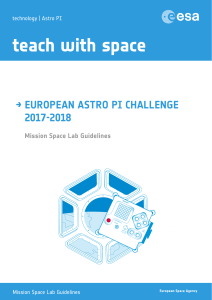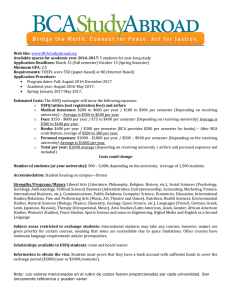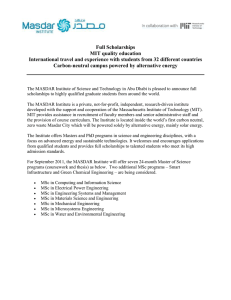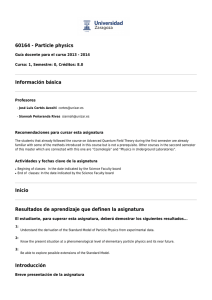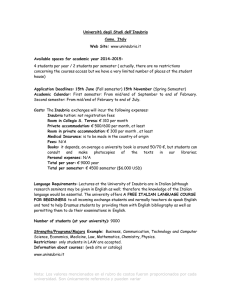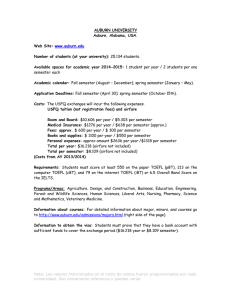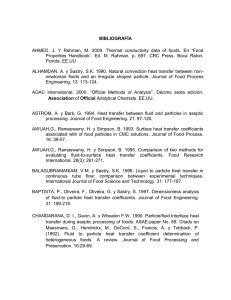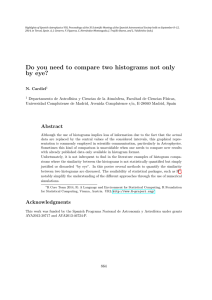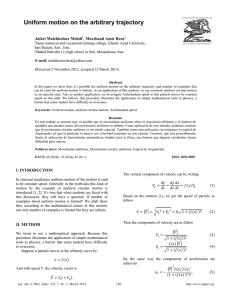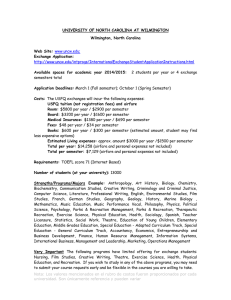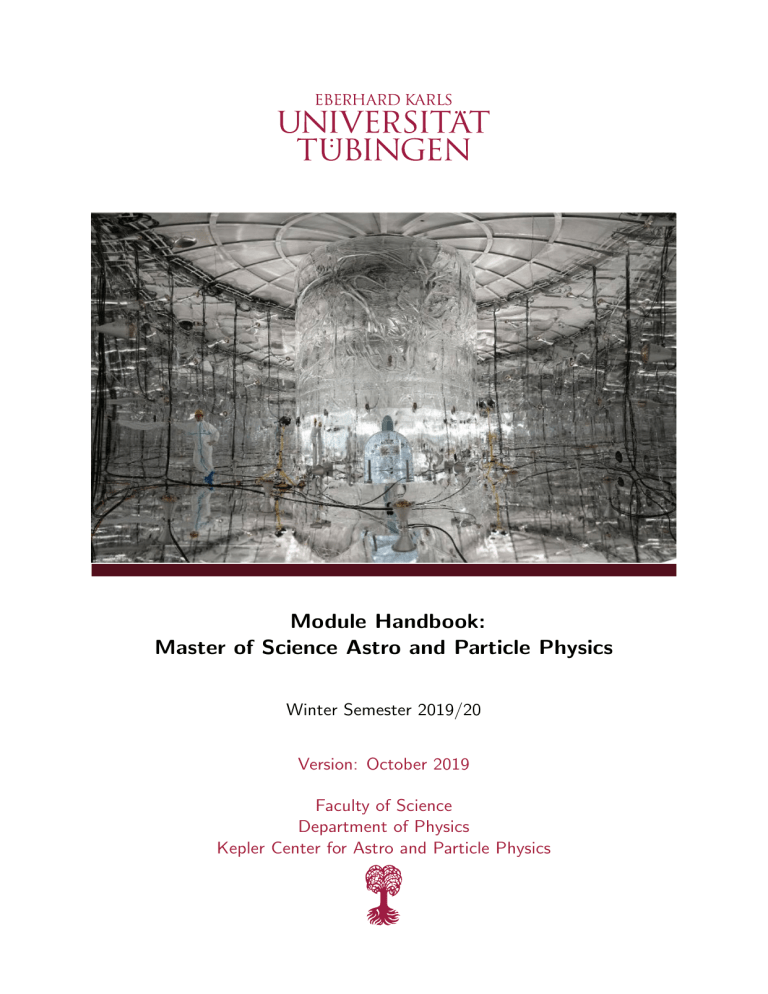
Module Handbook: Master of Science Astro and Particle Physics Winter Semester 2019/20 Version: October 2019 Faculty of Science Department of Physics Kepler Center for Astro and Particle Physics MSc. Astro and Particle Physics MODULE HANDBOOK Contents 1 Objectives of the Programme 1.1 Requirements . . . . . . . . . . . . . . . . . . . . . . . . . . . . . . . . . . . . . . 3 4 2 Module Overview 2.1 Overview by modules . . . . . . . . . . . . . . . . . . . . . . . . . . . . . . . . . . 2.2 Sample Study Plan . . . . . . . . . . . . . . . . . . . . . . . . . . . . . . . . . . . 2.3 Overview by Study Progress and Credit Requirements . . . . . . . . . . . . . . . . . 5 5 7 8 3 Module Descriptions 9 4 Module - Lecture - Dependencies 30 2 MSc. Astro and Particle Physics 1 MODULE HANDBOOK Objectives of the Programme The Master of Science Programme in Astro and Particle Physics is an international research-oriented two year Master programme established by the Kepler-Center of the University of Tübingen. The Kepler-Center is part of the Physics Department within the Faculty of Science of the University of Tübingen. It consists of scientists from three different institutes within the Physics Department: Institute for Astronomy & Astrophysics, Physical Institute and the Institute for Theoretical Physics. The Kepler-Center has a research focus in the areas of Astronomy & Astrophysics, Astroparticle Physics and Particle Physics, and it manages a coordinated PhD-programme with the topic: Particles, Fields and Messengers of the Universe with about 30 PhD students. The new Master programme connects science from the fields of particle physics, astrophysics and cosmology and combines different disciplines in experimental and theoretical physics, astronomy and astrophysics. Scientists of the Kepler-Center use various methods to discover the origin, structure and evolution of our universe the properties of elementary particles under extreme conditions. This is one of the research foci of the University of Tübingen (see: Uni-Tübingen-Webpage). The Southern German region concentrates industrial companies with a strong Hi-Tech component. These and other companies elsewhere have a high demand on well qualified young people with a strong background in natural sciences. Presently many physicists educated at the University Tübingen work in technology oriented companies in this region, and the graduates from this Master programme will find an industrial environment with a strong demand on highly skilled people. The graduates of this Master programme Astro and Particle Physics receive a comprehensive education in experimental as well as theoretical physics with a practical section and they are well prepared for the duties in industry and in other research oriented institutions. The education will be in English throughout which prepares the students for the increasing internationalization in industry and modern society. Due to the various research topics within the Kepler-Center students will obtain an education in a wide variety of topics ranging from experimental, numerical to theoretical. The focus of the educational programme is put on a distinct quantitative approach as usual in physics, along with the acquisition of essential practical skills (primarily in the lab) with respect to problem sets in the field of Astro and Particle Physics. The overall goal of the Master course is to impart solid knowledge and competences to qualify students to independently plan and carry out original scientific research in astro and particle physics and to critically evaluate their findings in comparison with published results. The qualification goals in more detail: • Our graduates have a sound standing in basic and advanced astro and particle physics covering various research fields including for example theoretical quantum field theory, general relativity, computational astrophysics, experimental neutrino physics, and many others. • They are capable to critically scrutinize the suitability of specific scientific methods for studying various astro and particle physics related questions. In addition, they will be able to combine different techniques in a meaningful way to also make rather complex physical problems accessible. • They are able to plan and undertake independently appropriate theoretical and laboratory investigations (collecting, recording and analyzing relevant data sets and combining these with theoretical studies). • The graduates can present scientific findings of their research orally and in writing. Moreover, in discussions they are skilled to answer scientific questions in a proficient manner. At scientific meetings, they can communicate – in English – with experts in the field and contribute to discussions on current astro and particle physics related topics. The Master programme is a 2 year consecutive study with a modular structure. Students may join the programme twice a year, for the summer and winter semester. In the first year the students have to attend lectures, seminars and labwork consisting of 60 ECTS credit points. All students have 3 MSc. Astro and Particle Physics MODULE HANDBOOK to take two basic introductory modules Astronomy & Astrophysics and Particle Physics consisting of lectures and exercises in the first term, which lay the foundations for all students. These are augmented by an obligatory seminar and labwork. In the second term students can choose modules from a variety of different topics. In the second year the students will begin with the scientific work on a research topic of their choice in the areas of the Kepler-Center and finally write their Master Thesis, all together again 60 CP (30 for acquiring research oriented skills and 30 for the Thesis). 1.1 Requirements To participate in the MSc programme a Bachelor degree in Physics or a similar degree with a minimum grade of B (2,5 on the German scale) is required. The Exam Committee (Prüfungsausschuss) decides about the equivalence of the degree and possibly additional requirements such as additional lectures or lab classes that have to be taken. In case of a too large number of participants a Selection Committee will decide about the acceptance. English is the language of instruction and examination in the Astro and Particle Physics Master degree program. An adequate knowledge of English is required (level B2 of the Common European Framework of Reference for Languages). 4 MSc. Astro and Particle Physics 2 MODULE HANDBOOK Module Overview To complete the program students have to earn in total 120 credit points from a suite of compulsory and elective modules. 2.1 Overview by modules The following list contains the modules offered within the Master programme Astro and Particle Physics. Module Code Obligatory / Elective Recommended Semester Credit Points APP101 O Astronomy & Astrophysics 1 9 APP103 O Laboratory Work 1-2 6 APP104 O Modern Topics in Astro and Particle Physics 1+2 6 APP102 O Particle Physics 2 9 APP201 E Theoretical Astrophysics 1 6 APP202 E Computational Methods in Physics/Astrophysics 1-2 6 APP203 E Stellar Physics 1-2 6 APP204 E General Relativity 1 6 APP205 E Relativistic Astrophysics 2 6 APP206 E Star and Planet Formation, Exoplanets 1-2 6 APP211 E Neutrino Physics 1 6 APP212 E High Energy Astrophysics 1 6 APP213 E Cosmology 2 6 APP214 E Extragalactic Astrophysics and Structure Formation 2 6 APP215 E Space Physics and Astrophysics 2 6 APP221 E Quantum Field Theory 1 6 APP301 O Module of neighboring Field 2 6 APP401 O Scientific Specialisation in Thesis Topic 3 15 APP402 O Methods and Project Planning 3 15 APP403 O Master-Thesis 4 30 Module Title Notes: The first section contains the required modules APP101 - APP104 that consist of a total of 30 CP. The modules APP101 and APP102 are two basic lectures laying the foundations for the Master study. Module APP103 requires practical (laboratory) work and module APP104 contains a Seminar (APP104a) and one Lecture (APP104b) that introduce the students to modern research in the field of astro and particle physics. Sections APP201 to APP221 consist of elective modules where the students have to select modules adding up to a total of 24 CP. These modules consist typically of lectures and exercises that cover topics from astro and particle physics. The students can select any modules from this which allows them familiarize themselves with a broader range of scientific fields offered within this Master programme. 5 MSc. Astro and Particle Physics MODULE HANDBOOK The module APP301 should be taken from neighboring scientific fields - not astro and particle physics. This includes for example advanced modules from the 4-year Bachelor study of Physics (not listed explicitly in the above table), or other advanced modules from Mathematics. Choices from other fields are also possible but require a decision of the Exam Committee (Prüfungsausschuss) on an individual basis. Taking this additional course from a neighboring field will allow the students to acquire knowledge, methods and skills in related scientific areas that will be helpful in their Master research in Astro and Particle Physics, and will teach the students how to cooperate with other disciplines and find joint solutions. The final part, modules APP401 - APP403, are obligatory and contain the Master Thesis itself (APP403) and two preparatory modules (APP401, APP402) introducing into scientific research. Grading: At least two of the elective modules APP201-APP221 (a minimum of 12 CP) need to be graded. The final grade of the MSc. in Astro and Particle Physics is calculated as 2/3 times the grade of the Master Thesis plus 1/3 times the average grade of compulsory modules A101 and A102 (18 CP) and the graded modules from the elective area (12 CP). 6 MSc. Astro and Particle Physics 2.2 MODULE HANDBOOK Sample Study Plan The following table shows exemplary a sample plan for a possible two year study within the Master programme. Semester Modules APP101 1 Astronomy physics & 9 CP Astro- APP103 APP104 APP203 APP204 Laboratory Work Modern Topics Stellar Physics General Relativity 6 CP in 6 CP 6 CP Astro 2 3 APP102 APP202 and Particle APP213 APP301 Particle Physics Computational Methods Physics Cosmology Neighboring Field 9 CP 6 CP 6 CP 6 CP 6 CP APP401 APP402 Scientific Specialisation in Thesis Topic Method and Project Planning 15 CP 15 CP APP403 4 Master-Thesis 30 CP Notes: Module APP104 contains a Seminar (APP104a) and one Lecture (APP104b) and is therefore split over semesters 1 and 2. We encourage students to work and study abroad for some extended time period during their studies in this Master programme. Convenient windows for such stays abroad are the 2nd or 3rd semester. 7 MSc. Astro and Particle Physics 2.3 MODULE HANDBOOK Overview by Study Progress and Credit Requirements The following table gives an overview on the Study Progress (the used abbreviations are explained in the next section) Basic Research in Astro and Particle Physics APP101 Astronomy & Astrophysics g W 180 6 o L, E APP102 Particle Physics g W 180 6 o L, E APP103 Laboratory Work ng 4 o P APP104 Modern Topics ng 4 o S,L Specialisation Module Total Semester Type of Course Status Contact Hours Course Weight Duration Type of Exam The allocation of CPs to courses is for information only. Credits are only awarded upon completion of the module. Grading Assessment The allocation of exams to semesters is a recommendation only. Compulsory allocations are marked as such. 1. 2. 3. 4. CP CP CP CP CP 30 21 9 30 30 9 9 6 24 3 3 6 18 APP201 Theoretical Astrophysics g O 30 4 e L, E APP202 Computational Methods g O 30 4 e L, E APP203 Stellar Physics g O 30 4 e L APP204 General Relativity g W 60 4 e L, E APP205 Relativistic Astrophysics g O 30 4 e L APP206 Star/Planet Formation g O 30 4 e L APP211 Neutrino Physics g O 30 4 e L 6 APP212 High Energy Astrophysics g O 30 4 e L, E 6 APP213 Cosmology g O 30 4 e L, E 6 APP214 Extragalactic Astrophysics g O 30 4 e L, E 6 APP215 Space Physics and Astrophysics g O 30 4 e L, E 6 APP221 Quantum Field Theory g O 30 4 e L, E Neighboring Field APP301 Module Field 6 6 6 6 6 6 6 6 of 6 neighboring ng 4 o L/E APP401 Methods and project planning ng 30 o PR 15 APP402 Scientific specialisation in Thesis topic ng 30 o PR 15 Master-Thesis g 60 o MT Scientific Work APP403 Total 6 60 (Credit Points) MT 30 120 30 30 30 30 8 MSc. Astro and Particle Physics 3 MODULE HANDBOOK Module Descriptions The following module descriptions give a comprehensive overview of the Astro and Particle Physics Master course (APP). The information compiled reflects the course profiles as of October 2016. The module content, the lecturers as well as single lectures might be subject to changes. The following abbreviations are used in the individual module prescriptions and in the previous overview of the study progress. Key Grading g = graded; ng = not graded (pass/fail); ne = no module examination Type of Exam W = written exam; O = oral exam; T = term paper; P = classroom presentation, A = assignment / term paper, written report Duration: duration of the examination in minutes Weight: courses: weighting of the examination grade towards the module grade modules: weighting of the module grade towards the final grade Contact Hours: CH; hours spent in the classroom per week during the semester Status: o = obligatory; e = elective Type of Course L = lecture; S = seminar; E = exercise; T = tutorial, P = practical work, PR = project related research, MT = Master-Thesis CP: Credit Points (ECTS Credits) Notes: Several of the modules described in the following consist of a lecture (L) in combination with exercise (E). This is the most common form of teaching and learning in the field of physics and astrophysics. Typically, it contains independent homework of the students as well as team-working through joint discussions of the (weekly) problem sheets. The results of their homework will have to be presented and discussed by the students in the corresponding exercise classes. 9 MSc. Astro and Particle Physics MODULE HANDBOOK Module Code: Module Title: Type of Module: APP101 Astronomy and Astrophysics. obligatory CP: (ECTS Credits) 9 Workload: - Time in Class - Self-Study Total workload: 270 h Duration: 1 Semester Frequency: Winter semester Language of Instruction: English. Forms of Teaching and Learning: Lecture with Exercises. Time in Class: 90 h / 6 SWS Self-Study: 180 h 4 6 Exercises E o 2 3 Weight for Grade o Evaluation Type L Length of Exam Lecture Requirements for Obtaining Credit, Grading, weight if appl.: Type of Exam CP The students will obtain knowledge of the basic principles of astronomy and astrophysics. They are able to transfer and apply physical processes from other fields to astrophysical phenomena. Through solving a series of exercises and apply the methods presented in the lecture they acquire necessary skills for independent problem solving and deepen their understanding. CH Objectives: Status The module deals with the fundamentals of astronomy and astrophysics to be known by all students. This includes: observational techniques, radiative transport, the Solar System, stars and planets, the Milkyway, galaxies, large scale structure, cosmology. Type of course Content: W 180 g 1.0 Transfer: BSc in Physics, MSc Astro and Particle Physics. Prerequisites: The module requires a basic physical and mathematical knowledge. 10 MSc. Astro and Particle Physics MODULE HANDBOOK Module Code: Module Title: Type of Module: APP102 Particle Physics. obligatory CP: (ECTS Credits) 9 Workload: - Time in Class - Self-Study Total workload: 270 h Duration: 1 Semester Frequency: Winter semester Language of Instruction: English. Forms of Teaching and Learning: Lecture with Exercises. Time in Class: 90 h / 6 SWS Self-Study: 180 h 4 6 Exercises E o 2 3 Weight for Grade o Evaluation Type L Length of Exam Lecture Requirements for Obtaining Credit, Grading, weight if appl.: Type of Exam CP The students will obtain knowledge of the basic principles of particle physics. They have acquired an understanding about the fundamental constituents of matter, energy and their interactions in the Universe. The students will solve a series of exercises and apply the methods presented in the lecture to deepen their understanding. CH Objectives: Status The module deals with the fundamentals of particle physics to be known by all students. This includes experimental as well as theoretical aspects. Type of course Content: W 180 g 1.0 Transfer: BSc in Physics, MSc Astro and Particle Physics. Prerequisites: The module requires a basic physical and mathematical knowledge. 11 MSc. Astro and Particle Physics MODULE HANDBOOK Module Code: Module Title: Type of Module: APP103 Laboratory Work. obligatory CP: (ECTS Credits) 6 Workload: - Time in Class - Self-Study Total workload: 180 h Duration: 1 Semester Frequency: Every term. A laboratory class is offered each semester. Language of Instruction: English. Forms of Teaching and Learning: Time in Class: 60 h / 4 SWS Self-Study: 120 h Practical Course. The students have to select one of the two lab courses offered. o 2 3 Advanced Labwork in Astrophysics P o 2 3 Weight for Grade P Evaluation Type Advanced Physics Laboratory Length of Exam Module Components Type of Exam Requirements for Obtaining Credit, Grading, weight if appl.: CP Through the laboratory work the students will obtain a hands-on expertise in performing and analyzing actual physical and astrophysical experiments. They will be able to prepare a meaningful and concise scientific report of their findings. CH Objectives: Status The module introduces the students to modern laboratory work in the field of physics and astrophysics. This includes data acquisition and handling, detailed error analysis, and writing a report about the obtained results. Type of course Content: - - ng - Transfer: BSc in Physics, MSc Astro and Particle Physics. Prerequisites: The module requires a basic physical and mathematical knowledge. 12 MSc. Astro and Particle Physics MODULE HANDBOOK Module Code: Module Title: Type of Module: APP104 Modern Topics in Astro and Particle Physics. obligatory CP: (ECTS Credits) 6 Workload: - Time in Class - Self-Study Total workload: 180 h Duration: 1 or 2 Semesters Frequency: Every term. A seminar is offered each semester. The lectures are distributed over 2 semesters, the student can start at any time. The student has to select one Seminar and one Lecture from the list below or any other equivalent lecture from the MSc programme. Language of Instruction: English. Forms of Teaching and Learning: Seminar and Lecture. Time in Class: 60 h / 4 SWS Self-Study: 120 h o 2 3 Modern Topics in Astronomy and Astrophysics S o 2 3 Extrasolar Planets and Planet Formation L o 2 3 Collider Physics L o 2 3 Experimental Astroparticle Physics L o 2 3 Cosmology L o 2 3 Weight for Grade S Evaluation Type Astro and Particle Physics Length of Exam Module Components Type of Exam Requirements for Obtaining Credit, Grading, weight if appl.: CP The students are familiar with different theoretical approaches in astro and particle physics. They are able to analyze and contextualize research in the field and are able to critically evaluate positions in literature research, and to discuss and present them in an appropriate and accessible fashion. The accompanying lecture will deepen the knowledge in a specific research field within astro and particle physics. CH Objectives: Status The module introduces the students to modern topics in the field of astro and particle physics. Type of course Content: - - ng - - - ng - Transfer: BSc in Physics, MSc Astro and Particle Physics. Prerequisites: The module requires a basic physical and mathematical knowledge. 13 MSc. Astro and Particle Physics MODULE HANDBOOK Module Code: Module Title: Type of Module: APP201 Theoretical Astrophysics. elective CP: (ECTS Credits) 6 Workload: - Time in Class - Self-Study Total workload: 180 h Duration: 1 Semester Frequency: Winter semester Language of Instruction: English. Forms of Teaching and Learning: Lecture with exercises. Time in Class: 60 h / 4 SWS Self-Study: 120 h e 2 3 Exercises E e 2 3 Weight for Grade L Evaluation Type Lecture Length of Exam Module Components Type of Exam Requirements for Obtaining Credit, Grading, weight if appl.: CP The students will obtain knowledge of important non-linear hydrodynamic processes. They will be able to solve the equations through linearization and make simple applications. The students will solve a series of exercises and apply the methods presented in the lecture to deepen their understanding. CH Objectives: Status The module deals with the fundamentals of theoretical research in astrophysics, and important applications. This includes: the equations of hydrodynamics, sound waves, shock waves, linearization, magnetohydrodynamics. Type of course Content: O 30 g 1.0 Transfer: BSc in Physics, MSc Astro and Particle Physics. Prerequisites: The module requires a basic physical and mathematical knowledge. 14 MSc. Astro and Particle Physics MODULE HANDBOOK Module Code: Module Title: Type of Module: APP202 Computational Methods in Physics and Astrophysics. elective CP: (ECTS Credits) 6 Workload: - Time in Class - Self-Study Total workload: 180 h Duration: 1 Semester Frequency: Winter or Summer term. The students can choose from two lectures (incl. exercises), one offered in the Winter term the other in the Summer. Language of Instruction: English. Forms of Teaching and Learning: Lecture with exercises. Time in Class: 60 h / 4 SWS Self-Study: 120 h CH CP Numerical Methods L Physics/Astrophysics e 2 3 Exercises E e 2 3 Computational Astrophysics L e 2 3 Exercises E e 2 3 Scientific Programming with Python L e 2 3 Exercises E e 2 3 Weight for Grade Status Requirements for Obtaining Credit, Grading, weight if appl.: Evaluation Type The students will obtain knowledge of important concepts in numerical analyses that occur in many physical and astrophysical applications. Through the lecture and accompanying exercises they will learn how to develop, implement and apply numerical algorithms using modern programming languages. Length of Exam Objectives: Type of Exam The module deals with the fundamentals of numerical methods applicable to solving problems in Computational Astrophysics and Physics. This includes: Interpolation, integration, ordinary and partial differential equations, N-body problems, elliptic, heat and wave equations. Type of course Content: O 30 g 1.0 Transfer: BSc in Physics, MSc Astro and Particle Physics. Prerequisites: The module requires a basic physical and mathematical knowledge. 15 MSc. Astro and Particle Physics MODULE HANDBOOK Module Code: Module Title: Type of Module: APP203 Stellar Physics elective CP: (ECTS Credits) 6 Workload: - Time in Class - Self-Study Total workload: 180 h Duration: 1 or 2 Semesters Frequency: Every semester. The 3 lectures are distributed over two semesters, the student can start at any semester. The student selects any two of these courses. Language of Instruction: English Forms of Teaching and Learning: Lectures Time in Class: 60 h / 4 SWS Self-Study: 120 h e 2 3 Stellar Oscillations L e 2 3 Stellar Atmospheres L e 2 3 Weight for Grade L Evaluation Type Stellar Structure and Evolution Length of Exam Module Components Type of Exam Requirements for Obtaining Credit, Grading, weight if appl.: CP The students will obtain knowledge of modern concepts and numerical techniques to describe processes in stars and the time evolution of stars. They will learn how theoretical modeling and observations are combined to advance our knowledge of stars and to uncover their role as engines that drive the chemical evolution of the Universe. CH Objectives: Status The module consists of 3 independent lectures which cover the basic principles of stellar physics. 1) Stellar structure and evolution: Interior structure equations and properties of stellar matter. 2) Stellar oscillations: Theory of self-excited stellar pulsations and stellar seismology. 3) Stellar atmospheres: Structure and radiation transfer equations as a basis of quantitative stellar spectroscopy. Type of course Content: O 30 g 1.0 Transfer: BSc in Physics, MSc Astro and Particle Physics. Prerequisites: The module requires basic astronomical, physical and mathematical knowledge. 16 MSc. Astro and Particle Physics MODULE HANDBOOK Module Code: Module Title: Type of Module: APP204 General Relativity elective CP: (ECTS Credits) 6 Workload: - Time in class - self study Total workload 180 h Duration: 1 Semester Frequency: Winter semester Language of Instruction: English Forms of Teaching and Learning: Lecture with exercises. Time in Class 60 h / 4 SWS Self-Study 120 h e 2 3 Exercises E e 2 3 Weight for Grade L Evaluation Type Lecture Length of Exam Module Component Type of Exam Requirements for Obtaining Credit, Grading, weight if appl. CP The students will obtain knowledge of the basics of the prevailing theory of gravity. They will be trained in tensor calculus and in relativistic mechanics. They will gain knowledge of the structure and dynamics of relativistic objects such as black-holes. They will also obtain elementary knowledge of the neutron star’s theory, gravitational waves and relativistic cosmology. CH Objectives: Status The module includes an introduction to the General Theory of Relativity. It will include a short introduction to tensor analysis, derivation, interpretation and solution of Einstein’s equations, orbits in curved spacetimes, the theory and properties of black holes and elements of relativistic cosmology. Type of course Content: W 60 g 1.0 Transfer: BSc in Physics, MSc Astro and Particle Physics. Prerequisites: The module requires a basic physical and mathematical knowledge, electrodynamics and mechanics. 17 MSc. Astro and Particle Physics MODULE HANDBOOK Module Code: Module Title: Type of Module: APP205 Relativistic Astrophysics elective CP: (ECTS Credits) 6 Workload: - Time in class - self study Total workload 180 h Duration: 1 Semester Frequency: Summer semester Language of Instruction: English Forms of Teaching and Learning: Time in Class 60 h / 4 SWS Self-Study 120 h In both modules the training will be done via a combination of lectures, seminars by (external) experts, projects and presentations by the students. 2 3 Module Component L e 2 3 Weight for Grade e Evaluation Type L Length of Exam Module Component Requirements for Obtaining Credit, Grading, weight if appl. Type of Exam CP In the first sub-module (Gravitational Waves & Neutron Stars), the students will be trained in combining observational data with theory. The recent discovery of gravitational waves opened a new window into the universe and together with x- and gamma ray observation will provide information for the densest objects in the universe. In parallel, they will get training in the physics, dynamics and astrophysics of the most complicated material objects in the universe, the neutron stars. In the second sub-module (Theoretical and Experimental Tests of Gravity), the students will obtain knowledge of the post-Newtonian and perturbative approximations to gravity, they will learn also the potential alternative’s to Einstein’s theory and the experiments designed to validate them. The theoretical skills that they will acquire may be used in modern space technology and design. CH Objectives: Status The module includes two parallel series of lectures which can be selected independently. The first sub-module (Gravitational Waves & Neutron Stars) will include the theory of gravitational waves and their applications in astrophysics and cosmology. In the same sub-module a series of lectures on neutron star physics and astrophysics will be offered. The second sub-module (Theoretical and Experimental Tests of Gravity) will include an introduction to postNewtonian and perturbation approaches to general relativity. This knowledge will be used to study the basic experiments in gravitational physics and the potential extensions of the theory (alternative theories of gravity). Type of course Content: O 30 g 1.0 Transfer: BSc in Physics, MSc Astro and Particle Physics. Prerequisites: The module requires knowledge of electrodynamics, mechanics and general relativity. 18 MSc. Astro and Particle Physics MODULE HANDBOOK Module Code: Module Title: Type of Module: APP206 Star and Planet Formation, Exoplanets elective CP: (ECTS Credits) 6 Workload: - Time in Class - Self-Study Total workload: 180 h Duration: 1 or 2 Semesters Frequency: The individual lectures will be offered on a regular basis, they can be distributed over two semesters, the student can start at any semester. The student selects any two of these courses. Language of Instruction: English Forms of Teaching and Learning: Lectures Time in Class: 60 h / 4 SWS Self-Study: 120 h e 2 3 Planet Formation L e 2 3 Star Formation L e 2 3 Weight for Grade L Evaluation Type Extrasolar Planets Length of Exam Module Components Type of Exam Requirements for Obtaining Credit, Grading, weight if appl.: CP The students will obtain knowledge about the observational techniques required to detect extrasolar planets, and learn about the present status of the architecture and physical nature of the observed planets. They will learn about our current view on the formation of stars and planets both from an observational and theoretical standpoint. This includes modern concepts and theoretical techniques in order to understand the formation of planets in our Solar System and in extrasolar planetary systems. CH Objectives: Status The module consists of independent lectures which cover the observational aspects of extrasolar planets and theories about the formation of stars and their planetary systems in general, including out Solar System. It consists of the following lectures: 1) Extrasolar Planets. 2) Planet Formation. 3) Star Formation. Type of course Content: O 30 g 1.0 Transfer: BSc in Physics, MSc Astro and Particle Physics. Prerequisites: The module requires basic astronomical, physical and mathematical knowledge. 19 MSc. Astro and Particle Physics MODULE HANDBOOK Module Code: Module Title: Type of Module: APP211 Neutrino Physics. elective CP: (ECTS Credits) 6 Workload: - Time in Class - Self-Study Total workload: 180 h Duration: 1 Semester Frequency: Winter semester Language of Instruction: English. Forms of Teaching and Learning: Lecture Time in Class: 60 h / 4 SWS Self-Study: 120 h Module Components Type of Exam Length of Exam Evaluation Type Weight for Grade Requirements for Obtaining Credit, Grading, weight if appl.: CP The students will obtain knowledge on the properties of neutrinos and on their role in particle physics and in cosmology. The students will learn about the experimental techniques to study neutrinos and about the theoretical concepts to understand the fundamental role of neutrinos. With neutrino as an example, they will gain an understanding on the connection between particle properties and the structure of the Universe. CH Objectives: Status The module deals with the properties and the role of neutrinos. The experimental techniques to study neutrinos as well as the basic theoretical concepts are presented and discussed. This includes the basic particle properties: mass and spin, neutrino flavors, neutrino oscillations, Majorana- and Dirac-type neutrinos, See-Saw mechanism, and the role of neutrinos in cosmology. Type of course Content: Lecture L e 4 6 O 30 g 1.0 Transfer: BSc in Physics, MSc Astro and Particle Physics. Prerequisites: The module requires a basic knowledge in particle physics and in quantum mechanics. 20 MSc. Astro and Particle Physics MODULE HANDBOOK Module Code: Module Title: Type of Module: APP212 High Energy Astrophysics. elective CP: (ECTS Credits) 6 Workload: - Time in Class - Self-Study Total workload: 180 h Duration: 1 Semester Frequency: Winter Semester Language of Instruction: English. Forms of Teaching and Learning: Lecture with exercises. Time in Class: 60 h / 4 SWS Self-Study: 120 h e 2 3 Exercises E e 2 3 Weight for Grade L Evaluation Type Lecture Length of Exam Module Components Type of Exam Requirements for Obtaining Credit, Grading, weight if appl.: CP The students will obtain knowledge on the physics of the high energy processes, on the relativistic approach to astrophysical processes, on the mechanisms of the non thermal Universe. They will learn how to describe and understand astrophysical situations in which high energy radiation and particles are produced. The students will solve a series of exercises and apply the methods presented in the lectures to deepen their understanding, and to treat new astrophysical problems with the same formalism. CH Objectives: Status The module deals with the physics processes of the high energy Universe, from X-rays to Ultra High Energies. It includes a review of the basic concepts of radiation interaction and transport; all major radiative processes, from bremssstrahlung to synchrotron radiation and Compton effect; particle acceleration in the non thermal universe; production of cosmic neutrinos and cosmic rays. It also deals with the peculiar astrophysical environments in which high energy radiation is formed such as ionized plasmas, accretion disks, jets and shocks. Type of course Content: O 30 g 1.0 Transfer: BSc in Physics, MSc Astro and Particle Physics. Prerequisites: The module requires knowledge of physics and mathematics at the level normally obtained at the end of the 4th semester of undergraduate studies in physics, mathematics, or engineering. 21 MSc. Astro and Particle Physics MODULE HANDBOOK Module Code: Module Title: Type of Module: APP213 Cosmology. elective CP: (ECTS Credits) 6 Workload: - Time in Class - Self-Study Total workload: 180 h Duration: 1 Semester Frequency: Summer semester Language of Instruction: English. Forms of Teaching and Learning: Lecture with exercises. Time in Class: 60 h / 4 SWS Self-Study: 120 h e 2 3 Exercises E e 2 3 Weight for Grade L Evaluation Type Lecture Length of Exam Module Components Type of Exam Requirements for Obtaining Credit, Grading, weight if appl.: CP The students will obtain knowledge on the mathematical description of the Universe and learn about modern observational techniques of precision cosmology. They will learn how to calculate the influence of different types of matter on the evolution of the Universe. The students will solve a series of exercises and apply the methods presented in the lecture to deepen their understanding. CH Objectives: Status The module deals with the structure and the evolution of the Universe. This includes the basic concepts and equations of cosmology, different types of the Universe, the evolution of the Universe, the connection between particle physics and cosmology, observational cosmology and structure formation. Type of course Content: O 30 g 1.0 Transfer: BSc in Physics, MSc Astro and Particle Physics. Prerequisites: The module requires a basic physical and mathematical knowledge. 22 MSc. Astro and Particle Physics MODULE HANDBOOK Module Code: Module Title: Type of Module: APP214 Extragalactic Astrophysics and Structure Formation elective CP: (ECTS Credits) 6 Workload: - Time in Class - Self-Study Total workload: 180 h Duration: 1 Semester Frequency: Summer Semester Language of Instruction: English. Forms of Teaching and Learning: Lecture with seminars. Time in Class: 60 h / 4 SWS Self-Study: 120 h e 2 3 Seminars S e 2 3 Weight for Grade L Evaluation Type Lecture Length of Exam Module Components Type of Exam Requirements for Obtaining Credit, Grading, weight if appl.: CP The students will obtain knowledge on the astrophysics and cosmology of the extragalactic Universe. They will learn about modern observational techniques of extragalactic astronomy and will be able to define an observational program to investigate specific classes of extragalactic sources. The students will present a series of seminars to deepen their understanding of key topics of extragalactic astrophysics, while improving their communication capabilities in astrophysics, and science in general. The students will be also able to individually elaborate the cosmological implication of extragalactic astrophysics. CH Objectives: Status The module deals with the physics, the astrophysics, and the objects of the extragalactic Universe. Starting from the Milky way, galaxies, active galactic nuclei, cluster of galaxies, gamma ray-bursts will be presented. In addition we will present the astrophysics of structures formation and the objects of the high z Universe. The cosmological implications of the observation of the extragalactic universe will be also discussed. Type of course Content: O 30 g 1.0 Transfer: BSc in Physics, MSc Astro and Particle Physics. Prerequisites: The module requires a basic physical and mathematical knowledge. 23 MSc. Astro and Particle Physics MODULE HANDBOOK Module Code: Module Title: Type of Module: APP215 Space Physics and Astrophysics elective CP: (ECTS Credits) 6 Workload: - Time in Class - Self-Study Total workload: 180 h Duration: 1 Semester Frequency: Summer Semester Language of Instruction: English. Forms of Teaching and Learning: Lecture with seminars. Time in Class: 60 h / 4 SWS Self-Study: 120 h e 2 3 Seminars S e 2 3 Weight for Grade L Evaluation Type Lecture Length of Exam Module Components Type of Exam Requirements for Obtaining Credit, Grading, weight if appl.: CP The students will obtain knowledge on the scientific, experimental, and technological aspects of space-based exploration. Through seminars, organized by the students with the support of senior supervisors, key aspects of specific space-based investigations will be addressed and deepened. Students will confront in a creative way on the question: how can we design and operate a space mission? They will learn how to contextualize science exploration in space, from the definition of the science objectives, to the choices of technology and mission operations. CH Objectives: Status The module deals with physics and astrophysics at the core of spacebased research. The scientific objectives of space-based research, from fundamental physics to astrophysics and solar system exploration, will be presented and discussed. In addition, experimental techniques used in space science missions, and all related technologies (detectors, electronics), will be introduced and discussed. A relevant part of the course will also focus on the system components of a space missions, trying to answer the question: what are the key elements of a space mission? Type of course Content: O 30 g 1.0 Transfer: BSc in Physics, MSc Astro and Particle Physics. Prerequisites: The module requires basic knowledge of physics and mathematics. 24 MSc. Astro and Particle Physics MODULE HANDBOOK Module Code: Module Title: Type of Module: APP221 Quantum Field Theory elective CP: (ECTS Credits) 6 Workload: - Time in Class - Self-Study Total workload: 180 h Duration: 1 Semester Frequency: Winter semester Language of Instruction: English. Forms of Teaching and Learning: Lecture with exercises. Time in Class: 60 h / 4 SWS Self-Study: 120 h e 3 4 Exercises E e 1 2 Weight for Grade L Evaluation Type Lecture Length of Exam Module Components Type of Exam Requirements for Obtaining Credit, Grading, weight if appl.: CP Upon completion of the course, the students will be familiar with the concepts and essential techniques of quantum field theory. They will be able to derive and use the ingredients for basic and advanced quantum field theory computations. CH Objectives: Status The module gives an introduction into relativistic quantum field theory, describing its foundations and applications. It addresses the quantization of free fields, symmetries, causality, interactions, perturbation theory and Feynman rules, renormalization, gauge fields. Type of course Content: O 30 g 1.0 Transfer: BSc in Physics, MSc Astro and Particle Physics. Prerequisites: The module requires understanding of the concepts of advanced quantum mechanics and basic knowledge of particle physics. 25 MSc. Astro and Particle Physics MODULE HANDBOOK Module Code: Module Title: Type of Module: APP301 Module of Neighboring Field. obligatory CP: (ECTS Credits) 6 Workload: - Time in Class - Self-Study Total workload: 180 h Duration: 1 Semester Frequency: Summer semester Language of Instruction: English. Forms of Teaching and Learning: Lecture, possibly with Exercises. Time in Class: 60 h / 4 SWS Self-Study: 120 h 2 3 Exercises 1 E o 2 3 Lecture 2 L o 2 3 Lecture 3 L o 4 6 Weight for Grade o Evaluation Type L Length of Exam Lecture 1 Requirements for Obtaining Credit, Grading, weight if appl.: Type of Exam CP The students will acquire knowledge, methods and skills in related scientific areas. They are able to cooperate with other disciplines and find joint solutions, and be able to apply scientific expertise from other fields to Astro and Particle physics. CH Objectives: Status The module needs to be taken from a neighboring field, e.g. advanced courses from Mathematics or other fields of Physics that are not covered by the modules of this Master Programme. Examples from Mathematics are: Algebraic Topology, Numerics of instationary Differential Equations or and other courses. Type of course Content: - - ng - Transfer: BSc in Physics, MSc Astro and Particle Physics. Prerequisites: The module requires a basic physical and mathematical knowledge. 26 MSc. Astro and Particle Physics MODULE HANDBOOK Module Code: Module Title: Type of Module: APP401 Scientific Specialisation in Thesis Topic. obligatory CP: (ECTS credits) 15 Contact Time: 60 h / 4 SWS for the lecture, otherwise variable depending on the activity Self-Study: 120 h for the lecture, otherwise variable depending on the activity Workload: - Time in Class - Self-Study Total workload: 450 h Duration: 1 Semester Frequency: Every semester, the student can start any time in the 2nd year Language of Instruction: English. Forms of Teaching and Learning: Advising the students to perform independent scientific research which includes an andvanced lecture. Weight for Grade Elective Lecture or Seminars Evaluation Type Project related work Length of Exam Module Components Type of Exam Requirements for Obtaining Credit, Grading, weight if appl. CP The students are able to formulate independently an own research project and situate it within current scholarly debates. They are capable of developing own solution methods and present them in an appropriate manner. They can react appropriately to the feedback of peers and faculty, and they are also able to understand and provide feedback on other students’ projects. CH Objectives: Status The module serves to define a specific scientific project in theoretical or experimental astro and particle physics. To prepare the Master Thesis the student will specialize in a research group of the Kepler Center in which she/he will prepare the Thesis. Type of course Content: PR o - 9 - - ng - o 4 6 - - ng - L/S Transfer: The module prepares for the research in the subject of the Master Thesis. Can be used for the MSc in Physics Prerequisites: Completion of required modules APP101, APP102, APP103, APP104. 27 MSc. Astro and Particle Physics MODULE HANDBOOK Module Code: Module Title: Type of Module: APP402 Methods and Project Planning. obligatory CP: (ECTS credits) 15 Workload: - Time in Class - Self-Study Total workload: 450 h Duration: 1 Semester Frequency: Every semester, the student can start any time in the 2nd year Language of Instruction: English. Forms of Teaching and Learning: Advising the student to scientific methods and project planning. Contact Time: variable depending on the activity Self-Study: variable depending on the activity Module Component Type of Exam Length of Exam Evaluation Type Weight for Grade Requirements for Obtaining Credit, Grading, weight if appl. CP The students are able to prepare independently (albeit under the supervision of an adviser) a larger research project and to present it in an appropriate fashion. They critically evaluate secondary sources and situate their project within current scholarly discourses. They are able to demonstrate that they have acquired general knowledge and can critically discuss special topics of their choice against this background. CH Objectives: Status The module serves to teach the student methods of project management. The formulation, presentation and discussion of the project plan for the own research project will be done together with the supervisor. The project will be done in the research group in which the Master Thesis will be prepared. At the beginning of the module the supervisor will present the topic of the Thesis. Type of course Content: Project related research PR o - 15 - - ng - Transfer: The module prepares for the research in the subject of the Master Thesis. Can be used for the MSc in Physics. Prerequisites: Completion of required modules APP101, APP102, APP103, APP104. 28 MSc. Astro and Particle Physics MODULE HANDBOOK Module Code: Module Title: Type of Module: APP403 Master-Thesis. obligatory CP: (ECTS credits) 30 Workload: - Time in Class - Self-Study Total workload: 900 h Duration: 1 Semester Frequency: Every semester, the student can start any time in the 2nd year Language of Instruction: English. Forms of Teaching and Learning: Independent research project under supervision (100%). Contact Time: variable depending on the activity Self-Study: variable depending on the activity Length of Exam Evaluation Type Weight for Grade Module Component Type of Exam Requirements for Obtaining Credit, Grading, weight if appl. CP After successful completion of the Master Thesis, students have acquired profound skills in state-of-the art methods in Astro and Particle Physics. They are acquainted with the current scientific questions and recent publications in their research field. They are trained in compiling and analyzing scientific data and writing a scientific report. In addition to scientific expertise, students will acquire soft skills, such as time and project management, working in international, interdisciplinary teams, English communication and writing skills, and rules of responsible conduct of research. Overall, with successful completion of the Master Thesis, students proof their scientific competence and demonstrate that they are well prepared to tackle demanding research projects such as, for example, a doctoral thesis. CH Objectives: Status Scientific research, method developments, and/or laboratory tasks, preparation of a scientific essay Type of course Content: MT o - 30 A - g 1.0 Transfer: The module is the final one of the Master programme Can be used for the MSc in Physics Prerequisites: Completion of required modules APP101, APP102, APP103, APP104 and 18 ETCS from elective part APP201-APP221. 29 MSc. Astro and Particle Physics 4 MODULE HANDBOOK Module - Lecture - Dependencies The following table provides the relation between elective modules and lectures, and indicates which lecture can be used for which module. The module APP104 Modern Topics in Astro and Particle ” Physics“ consists of a seminar with 3 CP and a lecture with 3 CP. The lecture could be any of the following table. Lecture Modules Advanced Topics in Gravitation APP204, APP205 Black Hole Astrophysics APP204, APP205 Computational Astrophysics APP202 Cosmology APP213 Endpoints of Stellar Evolution: Supernovae, White Dwarfs, Neutron Stars, Black Holes APP203, APP212 Exoplanets APP206 Extragalactic Astronomy and Astrophysics APP214 High Energy Astrophysics APP212 Introduction to General Relativity APP204, APP205 Neutrinophysics - Experiments and Theory APP211 Numerical Methods in Physics and Astrophysics APP202 Physics of Stellar Atmospheres APP203 Planet Formation APP206 Quantum Field Theory APP221 Stellar Oscillations APP203 Stellar Structure and Evolution APP203 Theoretical Astrophysics APP201 30

